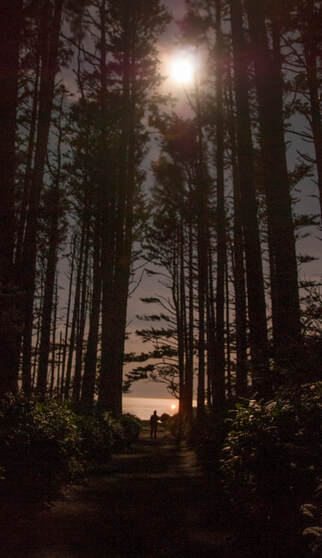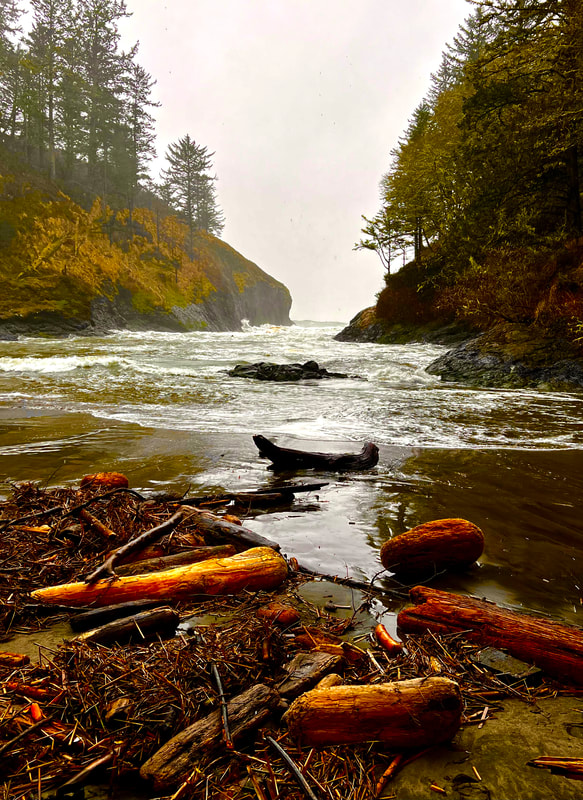|
Moon Creek
Traipsing through rich evergreen boughs Kwa Gulth moon scrambles between quick-silver rain Each drop prancing Like horse hooves on cobblestones Leaves bend down And winter breezes linger on our fingertips You touch them to my lips I hear the soft-speak of river song Or is it That little brown bird With a black crest On its tiny, feathered breast Entertaining me, this troubadour Playing a wind sonnet like a liberated harpsicord As moonglow dapples the sweet Flowing waters of Moon Creek Dances through watercress and wild celery Late, late Moonglow will soon kiss your eyelids Sleeping Beauty
0 Comments
Dead Man’s Cove
One of the joys of life centers around this place we live, here, in this corner of ever evolving landscape, the Columbia/Pacific. This is ground-zero of lifting and descending tides, of sandy, often-deserted beaches and the inevitable storms we label as “Pineapple Express” or a “Sou’wester,” storms that build momentum as they surge across the Pacific all the way from Hawaii. And then there are those not-so-common bluebird days enhanced with soft ocean breezes and brief dalliances of euphoria. Moods drape our happy homeland like a Christmas tree decked out in glittering tinsel. Since 9-11, one of those special places has been closed to human traffic. This is Dead Man’s Hollow, and it rests just a few hundred yards west of the Coast Guard station at Cape Disappointment. A natural cove, the small rocky opening specializes in busting up ocean combers that flood into the mouth of the Columbia River, dispensing their god-fearing wrath upon fishermen and the unwary. And now this destination is open to the wary traveler. Leave it to a couple of insistent hikers to stumble upon this sheltered beach in a storm. Leave it to the gods of winter to determine the worthy. Today, the landscape is writhing. A flood tide thrusts eight-foot waves through that narrow rocky opening while the physics of motion churn the steep combers into an aqueous frenzy. Drift logs have been pushed by years of high tides onto this narrow wind-swept beach. They linger like graffiti. Few driftwood-seeking humans have the strength or gumption to cart these shapely wooden chunks from their resting place. Because of the narrow opening in the igneous rock, the majority remain tangled on the winter beach for all to enjoy. The trail into the hollow can be intimidating, especially when the rain is thick and the ground soft and muddy. An older man now, I slip and slide a few times. The extra flesh on my behind bodes me well. Below, drift logs have been shaped into wooden sculptures, gnawed slowly by the force of water. Huge logs play their part in the evolving landscape. Cottonwood, fir and cedar, once trees of distinction, are quickly embedded into sandy beach. These sands were once rocks and stones of all sizes and shapes, rolled and broken over eons until their remnants were ground into pin-head size grains. Most everybody knows what I am talking about: The beauty of this hollow is a result of an evolution that extends far beyond human existence. But the exponential expansion of the human race continues to wreak havoc on Mother Earth. And for that reason alone, we appreciate a sheltered cove, a temporary haven where we might come once or twice a year and might just have it to ourselves. On a winter morning when the rain comes at you sideways, the reasonable option is to huddle inside our warm homes and brew a pot of coffee or a tea that comes all the way from China. In the background, the television distributes joy and pain, the current renditions of human conflict. But step outside. Brace yourself against the wind. Put on an extra layer of wool clothing and cover that with good rain gear. Gloves are nice but forget the umbrella. Now is your moment to have the beach to yourself. To feel the power of storm, the rip of tide, galloping pewter-colored clouds, and a soulful rain. Never mind if it drips down inside your collar. I find joy in the planet’s power, its ever-changing beauty. Joy in the footprints we leave in the soft sand. Joy in their disappearance as the combers rush around our ankles, occasionally catching us above the knees, hopefully not to travel further up our fragile bodies, for flesh is that, at least when confronted by the Pacific Ocean throwing a tantrum. Amidst all this action, stillness nestles here, just inside the Columbia River, for eons the home to the First Peoples. The movable feast that is ocean, the home of volatile winds and raging storms. Here is lovely and eternal landscape. |
David CampichePoet, author, chef and free-lance writer, Daily Astorian and Chinook Observer. Environmentalist. Archives
May 2023
Categories |


 RSS Feed
RSS Feed
